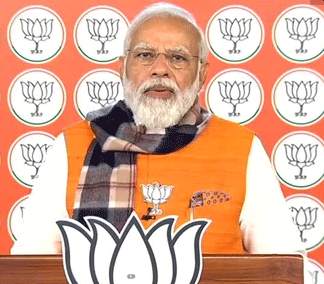From Our Bureau
NEW DELHI: The International Monetary Fund (IMF) is all praise for the Pradhan Mantri Garib Kalyan Yojana (PMGKAY) of providing free foodgrains to the poor, playing a key role in keeping the extreme poverty in India at the lowest level of 0.8% during the pandemic in 2020, the programme that was to end on March 31 this year but extended till September.
Its working paper titled ‘Pandemic, Poverty, and Inequality: Evidence from India’ presents estimates of poverty and consumption inequality in India for each of the years 2004-5 through the pandemic year 2020-21. It has been prepared by economists Surjit S Bhalla, Karan Bhasin and Arvind Virmani.
Bhalla is the executive director for India in the IMF and a former member of the PM’s economic advisory council from which he resigned in December 2018, while Arvind Virmani is former chief economic advisor of the Manmohan Singh government. Bhasin is Delhi-based policy researcher.
“Extreme poverty was as low as 0.8 per cent in the pre-pandemic year 2019, and food transfers were instrumental in ensuring that it remained at that low level in the pandemic year 2020,” it said.
Under PMGKAY, which was launched in March 2020, the central government provides 5 kilograms of foodgrains per month for free. The additional free grain is over and above the normal quota provided under the National Food Security Act (NFSA) at a highly subsidised rate of ₹ 2-3 per kilogram.
“Further, as early as 2016-17, extreme poverty had reached a low 2 per cent level. According to the more appropriate but 68 per cent higher Low Middle Income (LMI) poverty line of PPP (purchasing power parity) USD 3.2 a day, poverty in India registered 14.8 per cent in the pre-pandemic year 2019-20.
“This achievement is put in perspective by noting that in 2011-12, the official poverty level for the lower PPP USD 1.9 line was 12.2 per cent,” the working paper noted.
It also said that for the first time in several decades, extreme poverty — those falling below the USD 1.9 per person per day in terms of purchasing power parity — in the world increased in the pandemic year 2020.
As per the working paper, the pandemic support measures instituted by the government were critical in preventing any increase in the prevalence of extreme poverty and that food subsidies have reduced poverty on a consistent basis since the enactment of the FSA in 2013 and the co-incidental increase in the efficiency of targeting via Aadhaar.
Further, it said the effect of the subsidy adjustments on poverty is striking.
“Real inequality, as measured by the Gini coefficient, has declined to near its lowest level reached in the last forty years – it was 0.284 in 1993-94 and in 2020-21 it reached 0.292.
“Possibly the more surprising result from the incorporation of food subsidies into the calculation of poverty is that extreme poverty has stayed below (or equal to) 1 per cent for the last three years,” it said.
###



